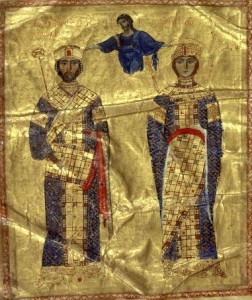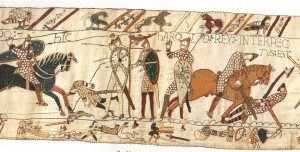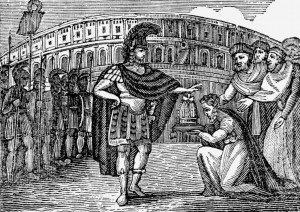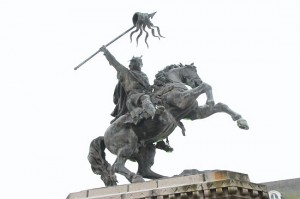 Reader Evan asked who was the last person from the original Roman patrician families to play a significant role in Byzantine history.
Reader Evan asked who was the last person from the original Roman patrician families to play a significant role in Byzantine history.
The last mention I can find is the Emperor Nicephorus III (1078-1081) who claimed to be descended from the ancient Fabii. This may have been wishful thinking on his part, but it does hint at the intriguing possibility that genealogical records survived the Byzantine ‘dark’ ages. The main problem with finding a descendant of the early families is that so many records were destroyed in the chaos of the 7th – 9th centuries, and many traditions were not maintained. And of course many patrician families had fallen on hard times even by Julius Caesar’s day (the Julii for example were impoverished) and the rank of Patrician became a mere political plaything during the empire. By the time of Augustus’ death (14 AD) only 15 families were left, and a century later that number had dropped to just 6. Constantine supplied new blood by opening the rolls to anyone in the imperial court (he was trying to lure as many patricians as possible to Constantinople to increase its prestige, and when that failed he just created new ones). Justinian further diluted it by making everyone of Senatorial rank a patrician. This was an easy (inexpensive) way of rewarding followers and it started an imperial trend of granting the rank in greater and greater numbers. By the 11th century it had been so extensively handed out that it meant little, and by the 12th century it disappeared completely.

Listener William asks why the Bayeux Tapestry is considered an important or credible source.
There are three main ‘eyewitness’ accounts of the Battle of Hastings- a short poem called Carmen de Hastingae Proelio (made as early as 1067), the Anglo Saxon Chronicle (9 manuscripts of year-by-year events kept at various monasteries across England), and the Bayeux Tapestry. The Tapestry (which isn’t really a tapestry at all), was most likely finished by 1077, and is a goldmine of inadvertent information. Commissioned by William’s half-brother Bishop Odo, it was intended to justify the Norman invasion while casting its two protagonists in a glowing, heroic light. Unfortunately this bias at times compromises the larger credibility of the work. For example, Harold’s coronation is shown being performed by Bishop Stigand, a man whose well-earned reputation for corruption had put a cloud over all of his dealings for years. As an earl, Harold had refused to let Stigand consecrate any of his religious foundations, and it’s unlikely that he would have let the tainted clergyman anywhere near the royal ceremony. His presence in the Tapestry is probably a none-too subtle Norman attempt to further discredit Harold. There are other bias’ in the work as well. Bishop Odo employed English artisans to execute the Tapestry, and there have been several books written about their subversive depictions of the Norman triumph.
But even with these reservations, the Tapestry remains a vital, eyewitness source for contemporary life and warfare in the 11th century. In it we can glimpse the weapons, armor, styles of clothing, and even the pursuits of leisure in the vanished Norman and Anglo-Saxon worlds.
 Listener Gary asks which of the few books on Belisarius are the best. My favorite is the classic one by Lord Mahon (Philip Henry Stanhope) called ‘The Life of Belisarius’. Originally published in 1829, it’s a bit outdated (it continues the myth of Belisarius’ blinding), but remains the standard if only for want of a serious rival. If you prefer a more modern perspective there is Ian Hughes’ 2009 ‘Belisarius: The Last Roman General’, and if you don’t mind a touch of historical fiction, there is Robert Graves’ (author of ‘I Claudius’) very entertaining- and generally historically accurate- version called ‘Count Belisarius’.
Listener Gary asks which of the few books on Belisarius are the best. My favorite is the classic one by Lord Mahon (Philip Henry Stanhope) called ‘The Life of Belisarius’. Originally published in 1829, it’s a bit outdated (it continues the myth of Belisarius’ blinding), but remains the standard if only for want of a serious rival. If you prefer a more modern perspective there is Ian Hughes’ 2009 ‘Belisarius: The Last Roman General’, and if you don’t mind a touch of historical fiction, there is Robert Graves’ (author of ‘I Claudius’) very entertaining- and generally historically accurate- version called ‘Count Belisarius’.
 Listener David points out, ‘you called William’s conquest of England the last successful invasion of England by a foreign army. Is that really the case? Didn’t Frenchman Henry Plantagenet invade with local support and force King Stephen to name him as his successor? Didn’t Welsh aristocrat Henry Tudor take the throne as Henry VIII with the help of Lancastrian allies? And wasn’t the “Glorious Revolution” actually a successful Dutch invasion of England? Isn’t it a double standard to categorize any successful invasion that has local support, as a civil war or a revolution instead of an invasion?’
Listener David points out, ‘you called William’s conquest of England the last successful invasion of England by a foreign army. Is that really the case? Didn’t Frenchman Henry Plantagenet invade with local support and force King Stephen to name him as his successor? Didn’t Welsh aristocrat Henry Tudor take the throne as Henry VIII with the help of Lancastrian allies? And wasn’t the “Glorious Revolution” actually a successful Dutch invasion of England? Isn’t it a double standard to categorize any successful invasion that has local support, as a civil war or a revolution instead of an invasion?’
David makes an excellent point here. All of these examples are invasions and can quite rightly be called as such. In each case non-English men seized power in England supplanting the previous dynasty. So calling William the last successful invader is not technically correct. I think there is a valid defense to be made, however, for distinguishing between these examples and what happened at Hastings in 1066. It’s a double standard, but the term ‘invasion’ is usually reserved for a massive social upheaval where an ethnically or culturally different force displaces the native regime. More than just a small change at the top (one related aristocrat for another) it’s a traumatic event that results in widespread effects at all social levels. In that respect, William was the last of a series of invaders: Roman, Anglo-Saxon, Viking, and finally Norman. No social upheaval quite so far-reaching has come at the hands of a foreign invader since.
 Reader Evan asked who was the last person from the original Roman patrician families to play a significant role in Byzantine history.
Reader Evan asked who was the last person from the original Roman patrician families to play a significant role in Byzantine history.

